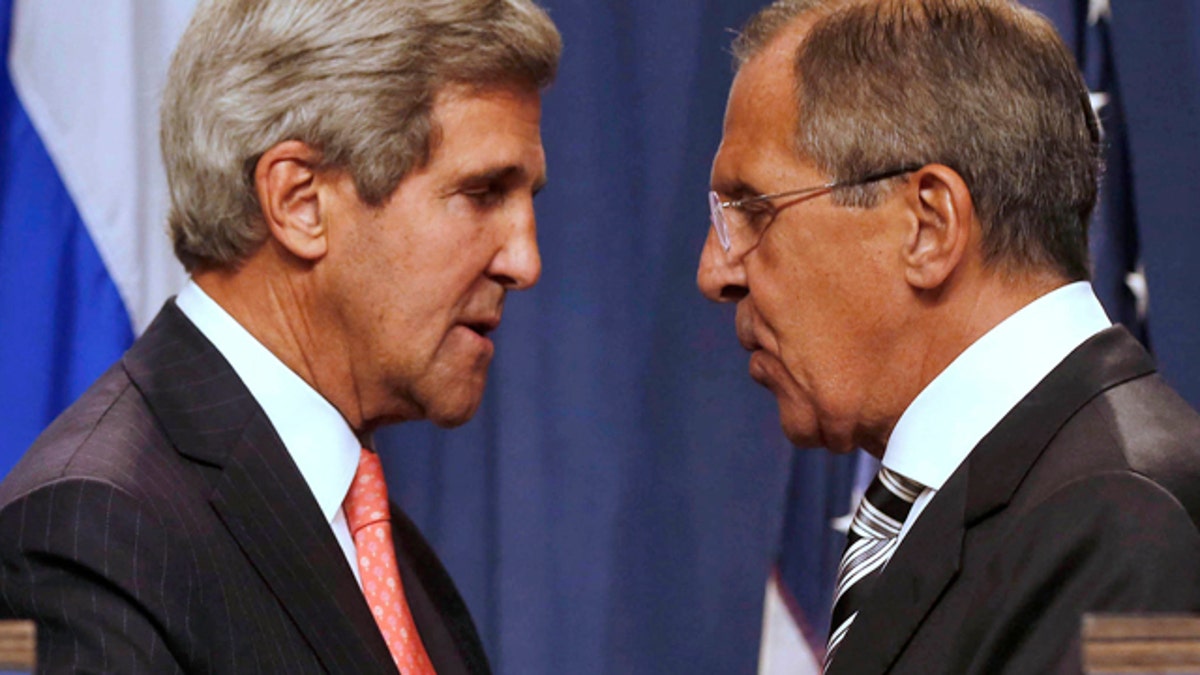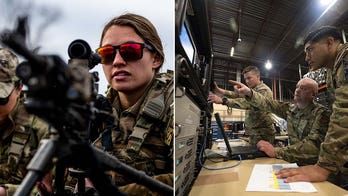
Sept. 14, 2013: U.S. Secretary of State John Kerry, left, and Russian Foreign Minister Sergei Lavrov, shake hands after making statements to the media following meetings regarding Syria, at a news conference in Geneva, Switzerland. (AP)
“At the end of the day,” an exhausted senior State Department official said, wrapping up three days of round-the-clock negotiations with Russia over the disposal of Syria’s chemical weapons arsenal, “the things that most mattered, I believe we got.”
Aides to Secretary of State John Kerry said he and his Russian counterpart, Foreign Minister Sergey Lavrov, joined by teams of technical advisers, intelligence and military officers, lawyers and policy experts, slogged through “hard-fought” talks that did not, in the end, result in complete agreement.
For example, the two delegations never came to terms on exactly how many sites the regime of Syrian President Bashar al-Assad uses to produce, mix, and store chemical weapons, nor on whether all of those sites are in areas that remain under regime control, as the U.S. maintains, and Russia denies.
But the diplomacy was remarkable, by all accounts, for how much the two sides did come to agree on, and how swiftly they were able to hammer out the four-page document finalizing the path forward. Under the agreement, Assad will have by next Friday to produce a full accounting of his chemical weapons arsenal, known in diplomatic parlance as a “declaration.”
The two sides did manage to agree that the Syrian regime possesses roughly 1,000 metric tons of chemical warfare agents and their precursors, including sarin, blister agents, and mustard gas, as well as the munitions needed to deploy them.
U.S. officials disclosed that they went into the negotiations asserting that within Syria, there are at least forty-five sites related to the chemical weapons arsenal, nearly half of which contain what weapons experts call “exploitable quantities” of chemical weapons.
Responding to recent reports that the Assad regime has worked assiduously to disperse its banned stockpile to different locations, in apprehension of possible U.S. military action aimed at degrading the regime’s ability to use these weapons, U.S. officials said they had seen “indications” of such activity but have “limited information” about it.
However, Secretary Kerry, in public remarks with Lavrov on Saturday afternoon, was more explicit in making clear that U.S. intelligence has tracked the efforts of the regime to disperse the stockpiles.
“They have moved them, and we know they have moved them,” Kerry said. “We’ve seen them. We’ve watched this.”
The formal destination for Assad’s declaration will be the Organization for the Prevention of Chemical Weapons (OPCW). If the declaration is determined to be evasive, incomplete, or otherwise unsatisfactory – U.S. officials described this as “the first litmus test” to determine how seriously Assad intends to implement the agreement the Russians negotiated on his behalf – then the OPCW can refer the regime to the United Nations Security Council for punishment.
Assuming the declaration is complete and satisfactory, the Assad regime will be responsible for allowing international weapons inspectors into his country and giving them “immediate and unfettered access” to all relevant sites in the country, both declared and undeclared. Again, non-compliance would result in referral to the U.N. Security Council, which will soon seek to finalize a resolution that codifies the agreement between the U.S. and Russia in international law.
That resolution, U.S. officials emphasized, will have “Chapter VII” authority, which provides for the use of military force, if approved by the Council, in the event the resolution is being defied or circumvented.
Kerry and Lavrov offered notably divergent interpretations of what the Chapter VII authority would mean in practice.
“There is an agreement between Russia and the United States that non-compliance is going to be held accountable within the Security Council under Chapter VII,” Kerry said. “What remedy is chosen is subject to the debate within the Council, which is always true. But there is a commitment to impose measures – that’s the language, ‘will impose measures’ – commensurate with whatever is needed in terms of accountability.”
Kerry also reaffirmed that President Obama will at all times – and even absent the authorization of the U.S. Congress – reserve the right to order unilateral military action by the United States’ armed forces, separate and apart from what transpires at the Security Council. But the Russian delegation emphasized the obstacles to any authorization of force by the Security Council.
“In case these requirements are not implemented, or in case anybody will use the chemical weapons, the Security Council will take measures under Article VII [sic] of the charter of the United Nations,” Lavrov said through an interpreter.
But, he immediately added, “Of course, it does not mean that every violation that will be reported to the Security Council will be taken by word. Of course, we will investigate every case, because there is a lot of false information, pieces of information, in the world, and we should be very cautious about every fact. And when we are sure, 100 percent, then we in the Russian Federation will be ready to adopt a new resolution of the Security Council to embed the measures to punish the perpetrators of this violation. And,” Lavrov concluded, with his usual acerbic tone, “it’s nonsense to continue the speculations on the matter today.”
Later, however, a senior State Department official was asked directly whether the U.S. expects Russia, which wields veto power at the Security Council, to block any attempt to invoke Chapter VII and apply military force to compel Assad’s compliance.
“I do,” the official answered.
That these international inspections are expected to occur during an active and raging civil war did not go un-addressed in the talks. All sides agreed to use their influence with the warring parties to provide security for inspectors – and Kerry made clear that that includes the rebels, even though the U.S. does not believe the rebels to control any of the areas where the relevant installations are located.
“Fair is fair,” Kerry said. The secretary cited the Syrian government’s recent movement of the stockpiles as the “silver lining” in the affair, because that, in theory, should make it easier for the regime to guarantee the inspectors’ safety.
Assuming such cooperation, the inspectors would seek to destroy some of the banned stockpiles and related facilities and equipment – including munitions used to deploy the weapons – at the sites where they are discovered. But officials said there will also be efforts made, where appropriate, to remove some of the weapons and other items from Syria to other countries.
Which countries would serve as the destination for the banned stockpiles the officials wouldn’t say, but they confirmed that Russia is among the few countries where such work could be performed.
Both Russia and the United States have the technological know-how, experience, and facilities to accomplish the destruction required, but the Department of Defense has also developed what one weapons expert called a “portable/transportable model” that would allow the destruction to take place in countries that don’t presently posses the requisite facilities.
Kerry also indicated during the news conference with Lavrov that other countries will be asked to absorb some of the costs associated with the enterprise. When Lavrov snapped that those countries that had offered to help pay for U.S. military strikes against Assad should be prepared to defray the expenses of the peaceful destruction of the arsenal, Kerry retorted that Lavrov should be sent to these countries to make the arrangements for payment.
After the agreement was announced, U.S. weapons experts spoke in highly technical terms about the various means – hydrolysis, incineration, the filling of empty munitions, and other methods – that would be employed to destroy the Syrian arsenal. In some cases, a senior State Department official said, only half-jokingly, “a big sledgehammer” would do the trick.
Stockpiles of mustard gas, for example, can properly be destroyed by either hydrolysis or incineration; the experts said decisions about which means to employ for which nerve agent or proscribed item would be made on the basis of “cost, feasibility, safety, and above all, speed.”
In all, the shared goal is to finalize the complete destruction of Syria’s chemical weapons arsenal by mid-2014. U.S. officials acknowledged that that timetable is “ambitious” and “daunting,” but reiterated that, with the Syrian regime’s full cooperation, it is “doable.”
U.S. officials stressed that they had in no way acceded to the demands presented by Assad, during a series of interviews on Russian television in recent days, as non-negotiable conditions for his compliance. These included his insistence that the threat of military force be removed from the pending U.N. Security Council resolution, and his demand that the U.S. stop supplying weapons to the Syrian rebels.
A senior State Department official said flatly that those supplies will not cease. What’s more, a top aide to Kerry maintained that the stated U.S. policy of wanting Assad to leave power, and hand over executive authority to a transitional government that could negotiate an end to Syria’s two-year civil war, is not at all affected by the U.S.-Russian agreement.
The American negotiators said they would regard the framework as legally binding upon any successor government that might be formed if and when Assad is ever deposed or voluntarily steps down.




